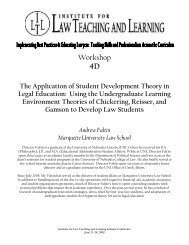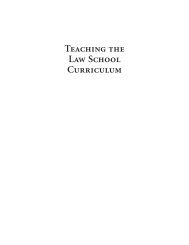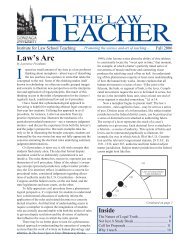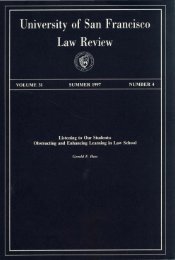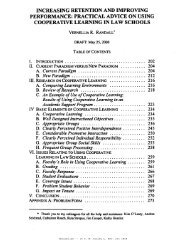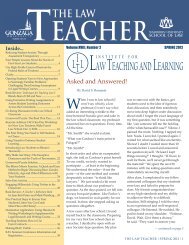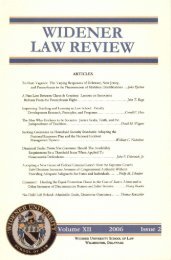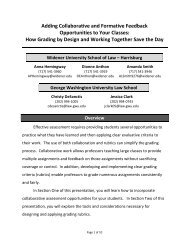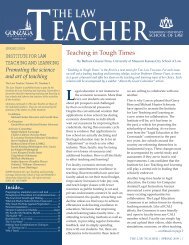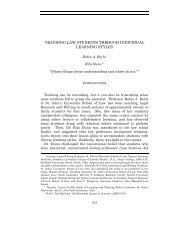Professional Skills and Values in Legal Education - Institute for Law ...
Professional Skills and Values in Legal Education - Institute for Law ...
Professional Skills and Values in Legal Education - Institute for Law ...
Create successful ePaper yourself
Turn your PDF publications into a flip-book with our unique Google optimized e-Paper software.
544 VALPARAISO UNIVERSITY LAWREVIEW [Vol. 43<br />
D. Tra<strong>in</strong> <strong>and</strong> Support Adjunct Faculty Members<br />
Practic<strong>in</strong>g attorney faculty members are generally enthusiastic <strong>and</strong><br />
well prepared. They are not, however, tra<strong>in</strong>ed educators. Much of their<br />
past experience <strong>in</strong> learn<strong>in</strong>g has come from the lecture or Socratic<br />
Method. Cont<strong>in</strong>u<strong>in</strong>g legal education courses offered by the bar <strong>and</strong><br />
programs at conferences often consist mostly of "talk<strong>in</strong>g heads." In<br />
addition, practic<strong>in</strong>g attorneys have a wealth of knowledge <strong>and</strong> stories<br />
about their practice that they are eager to share with students. Without<br />
proper orientation <strong>and</strong> tra<strong>in</strong><strong>in</strong>g, many practic<strong>in</strong>g attorneys would spend<br />
the class time talk<strong>in</strong>g. The students would do little other than listen <strong>and</strong><br />
take notes.<br />
Tra<strong>in</strong><strong>in</strong>g of the practic<strong>in</strong>g attorneys should start by expla<strong>in</strong><strong>in</strong>g that<br />
the teach<strong>in</strong>g plans emphasize that students "learn<strong>in</strong>g while do<strong>in</strong>g." The<br />
attorneys must underst<strong>and</strong> that they have three primary roles: (1) to<br />
provide the materials <strong>and</strong> <strong>in</strong><strong>for</strong>mation necessary to prepare the students<br />
<strong>for</strong> their skill exercises; (2) to give the students time to practice the skills<br />
<strong>and</strong> professional values; <strong>and</strong> (3) to provide positive <strong>and</strong> constructive<br />
feedback to students on their per<strong>for</strong>mance. 116<br />
Dur<strong>in</strong>g the course, a member of the full-time faculty should provide<br />
guidance <strong>and</strong> feedback to adjunct faculty members. In most cases, the<br />
course is as much a learn<strong>in</strong>g experience <strong>for</strong> the practitioner faculty<br />
member as it is <strong>for</strong> the students. The practitioner may be completely<br />
com<strong>for</strong>table <strong>in</strong> an office sett<strong>in</strong>g or a courtroom, yet experience<br />
nervousness <strong>and</strong> anxiety <strong>in</strong> teach<strong>in</strong>g law school students <strong>for</strong> the first<br />
time. There<strong>for</strong>e, the full-time faculty should provide the practitioner<br />
pictures of the students <strong>and</strong> start the course with student <strong>in</strong>troductions<br />
to help the faculty member quickly connect with the students. The<br />
practitioner faculty members should also be given constructive feedback<br />
at the end of each class period. The most difficult aspect of teach<strong>in</strong>g the<br />
General Practice <strong>Skills</strong> course <strong>for</strong> the practitioner faculty member may be<br />
to adhere to the teach<strong>in</strong>g plan <strong>and</strong> refra<strong>in</strong> from talk<strong>in</strong>g too much. Some<br />
of the Pheonix School of <strong>Law</strong> students noted that the <strong>in</strong>structor lectured<br />
too much <strong>and</strong> that there was not enough time to adequately complete the<br />
skills exercises. Practitioner faculty should be encouraged to "keep<br />
th<strong>in</strong>gs mov<strong>in</strong>g <strong>and</strong> the students do<strong>in</strong>g."<br />
116 For an excellent guide <strong>for</strong> faculty <strong>for</strong> provid<strong>in</strong>g effective feedback to students on<br />
per<strong>for</strong>mance of skills, see Ralph Cagle, Critiques of Students <strong>Law</strong>yer<strong>in</strong>g <strong>Skills</strong>, <strong>in</strong> GERALD F.<br />
HFSS & STEVEN FRIEDLAND, TECHNIQUFS FOR TEACHING LAW 310-13 (1999).



